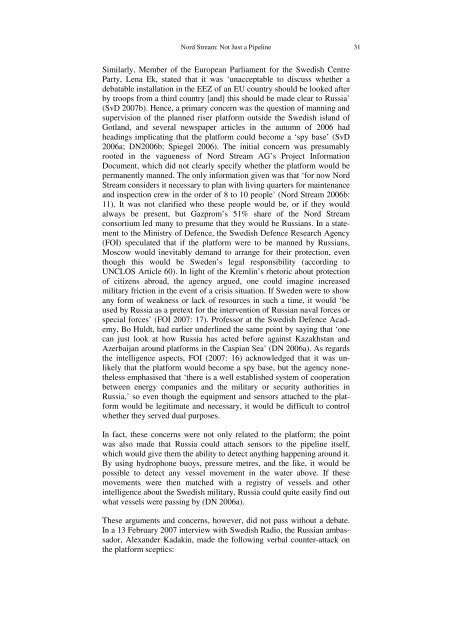Nord Stream: Not Just a Pipeline
Nord Stream: Not Just a Pipeline
Nord Stream: Not Just a Pipeline
Create successful ePaper yourself
Turn your PDF publications into a flip-book with our unique Google optimized e-Paper software.
<strong>Nord</strong> <strong>Stream</strong>: <strong>Not</strong> <strong>Just</strong> a <strong>Pipeline</strong> 31<br />
Similarly, Member of the European Parliament for the Swedish Centre<br />
Party, Lena Ek, stated that it was ‘unacceptable to discuss whether a<br />
debatable installation in the EEZ of an EU country should be looked after<br />
by troops from a third country [and] this should be made clear to Russia’<br />
(SvD 2007b). Hence, a primary concern was the question of manning and<br />
supervision of the planned riser platform outside the Swedish island of<br />
Gotland, and several newspaper articles in the autumn of 2006 had<br />
headings implicating that the platform could become a ‘spy base’ (SvD<br />
2006a; DN2006b; Spiegel 2006). The initial concern was presumably<br />
rooted in the vagueness of <strong>Nord</strong> <strong>Stream</strong> AG’s Project Information<br />
Document, which did not clearly specify whether the platform would be<br />
permanently manned. The only information given was that ‘for now <strong>Nord</strong><br />
<strong>Stream</strong> considers it necessary to plan with living quarters for maintenance<br />
and inspection crew in the order of 8 to 10 people’ (<strong>Nord</strong> <strong>Stream</strong> 2006b:<br />
11). It was not clarified who these people would be, or if they would<br />
always be present, but Gazprom’s 51% share of the <strong>Nord</strong> <strong>Stream</strong><br />
consortium led many to presume that they would be Russians. In a statement<br />
to the Ministry of Defence, the Swedish Defence Research Agency<br />
(FOI) speculated that if the platform were to be manned by Russians,<br />
Moscow would inevitably demand to arrange for their protection, even<br />
though this would be Sweden’s legal responsibility (according to<br />
UNCLOS Article 60). In light of the Kremlin’s rhetoric about protection<br />
of citizens abroad, the agency argued, one could imagine increased<br />
military friction in the event of a crisis situation. If Sweden were to show<br />
any form of weakness or lack of resources in such a time, it would ‘be<br />
used by Russia as a pretext for the intervention of Russian naval forces or<br />
special forces’ (FOI 2007: 17). Professor at the Swedish Defence Academy,<br />
Bo Huldt, had earlier underlined the same point by saying that ‘one<br />
can just look at how Russia has acted before against Kazakhstan and<br />
Azerbaijan around platforms in the Caspian Sea’ (DN 2006a). As regards<br />
the intelligence aspects, FOI (2007: 16) acknowledged that it was unlikely<br />
that the platform would become a spy base, but the agency nonetheless<br />
emphasised that ‘there is a well established system of cooperation<br />
between energy companies and the military or security authorities in<br />
Russia,’ so even though the equipment and sensors attached to the platform<br />
would be legitimate and necessary, it would be difficult to control<br />
whether they served dual purposes.<br />
In fact, these concerns were not only related to the platform; the point<br />
was also made that Russia could attach sensors to the pipeline itself,<br />
which would give them the ability to detect anything happening around it.<br />
By using hydrophone buoys, pressure metres, and the like, it would be<br />
possible to detect any vessel movement in the water above. If these<br />
movements were then matched with a registry of vessels and other<br />
intelligence about the Swedish military, Russia could quite easily find out<br />
what vessels were passing by (DN 2006a).<br />
These arguments and concerns, however, did not pass without a debate.<br />
In a 13 February 2007 interview with Swedish Radio, the Russian ambassador,<br />
Alexander Kadakin, made the following verbal counter-attack on<br />
the platform sceptics:













